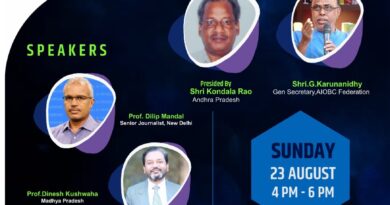10 free speech cases of 2020: In most, no relief from SC of India – except when Centre did not object: IE News
A scrutiny of the 10 cases involving free speech that came before the Supreme Court since January reveals a telling pattern.
Via Apurva Vishwanath of IE . https://indianexpress.com/article/india/10-free-speech-cases-this-year-in-supreme-court-6564796/
Significantly, in six other cases that raised similar issues where the Centre raised objections, the Supreme Court gave no relief to the petitioners.
A case seeking enforcement of the fundamental right to freedom of speech and expression is a classic citizen-versus-state litigation. But a scrutiny of the 10 cases involving free speech that came before the Supreme Court since January reveals a telling pattern: in cases where the court upheld that right or gave relief, the state and the petitioner argued on the same side; in six cases, where the state was the defendant and objected, there was no relief to the petitioner.
The first case in which the court granted relief was filed by Republic TV Editor-in-chief Arnab Goswami seeking quashing of FIRs filed in connection with a TV show on April 21 where he questioned Congress President Sonia Gandhi over the lynching of two sadhus and their driver in Palghar in Maharashtra. On May 19, the Supreme Court rejected all but one FIR and said that filing of multiple FIRs relating to the same incident constituted “an abuse of process and must be quashed.”
On June 25, the court stayed FIRs against journalist Amish Devgan for allegedly hurting religious sentiments in his show. The SC also suspended the investigation and transferred FIRs filed in multiple locations to Noida.
In both Goswami’s and Devgan’s pleas, the Central government was represented by Solicitor General Tushar Mehta who supported the quashing or stay of FIRs.
In Goswami’s case, Mehta criticised Maharashtra police’s handling of the case and even sought a transfer of investigation to the Central Bureau of Investigation.
On June 26, a two-judge vacation bench of the Supreme Court granted an ex-parte stay on multiple FIRs against journalist Nupur J Sharma and three others filed by the West Bengal police and suspended any further coercive action. Although Sharma’s plea listed the Centre as a respondent in the case, the court granted relief on the very first hearing without hearing its arguments.
Significantly, in six other cases that raised similar issues where the Centre raised objections, the Supreme Court gave no relief to the petitioners.
In the case involving Congress leader Pankaj Punia, the Supreme Court, on May 30, refused to intervene to quash FIRs in Haryana, Uttar Pradesh and Madhya Pradesh for a tweet that allegedly hurt religious sentiments.
Sharjeel Imam, a former Jawaharlal Nehru University student charged with sedition and hate speech also moved the top court over FIRs filed in at least five states: Assam, Arunachal Pradesh, Delhi, Uttar Pradesh and Manipur for the same speech he made in January.
On May 26, Imam sought a transfer of his pleas to Delhi but that is yet to be decided and last week, the SC adjourned his plea again by another week.
In contrast to orders in the Goswami and Devgan and Sharma’s cases, the Supreme Court also refused to stay the criminal investigation against journalist Vinod Dua in Himachal Pradesh in a sedition case filed by BJP leader Shyam Kumarsain.
On Friday, it adjourned the case on Solicitor General Mehta’s request and only heard arguments by Dua’s lawyer. Mehta had in previous hearings opposed Dua’s case and said that it could not be compared with those involving Goswami and Devgan.
Read | Freedom of speech extends to social media too: Vinod Dua to SC
Again, in contrast to the order in Nupur Sharma’s case, the Supreme Court on March 18 asked Gorakhpur-based paediatrician Kafeel Khan’s mother Nuzhar Perween to move the Allahabad High Court first to challenge the FIR against Khan for alleged inflammatory speech.
Khan was slapped with the National Security Act in December for an alleged inflammatory speech made criticising the Citizenship Amendment Act, 2019. Despite the SC directions, Allahabad HC is yet to decide on Khan’s release.
Protestors in Shaheen Bagh who halted the 100-day sit-in in view of the COVID-19 pandemic had also moved the Supreme Court that the demonstration site was cleared by the police and structures were dismantled. An SC-appointed team of interlocutors held talks with the protestors and had cleared a section of the protest site. The case has not been listed since March.
Also in March, the Supreme Court declined to hear activist Harsh Mander in a case related to communal riots in Delhi after Solicitor General Mehta raised objections to Mander’s plea and said that he was “seen instigating” people. Mander’s lawyer was not allowed by the court to argue in the case.
In cases relating to Kashmir challenges to the communications blockade imposed following the abrogation of special status to the state in August 2019, although the Supreme Court reiterated the inalienability of freedom of speech and expression, it did not adjudicate on the facts of the case citing national security concerns. Incidentally, Attorney General for India K K Venugopal had argued that while deciding on freedom of speech and expression, the court must take into account, “the background of terrorism in the state.”
Interestingly, free speech was cited by the Supreme Court on July 23, while hearing a plea relating to the disqualification of 19 rebel Congress MLAs in Rajasthan, the Supreme Court bench led by Justice Arun Mishra said that “voice of dissent cannot be suppressed in a democracy.” The Congress party withdrew the plea before the Centre was made a party to that case.


